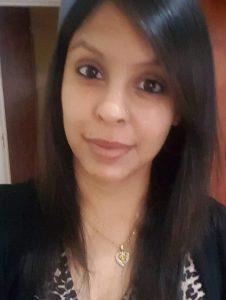 Our July Immunologist of the month is Dr Heena Ranchod based at the Centre for Vaccines and Immunology, National Institute for Communicable Diseases in Johannesburg, South Africa. Dr Ranchod completed her BSc at the University of the Witwatersrand, and pursued both completed her post-graduate training at University of Pretoria. Her research focus is on TB immunology. She initially began her research career focusing on antibodies and, has now moved to the field of TB-host immuno-metabolism.
Our July Immunologist of the month is Dr Heena Ranchod based at the Centre for Vaccines and Immunology, National Institute for Communicable Diseases in Johannesburg, South Africa. Dr Ranchod completed her BSc at the University of the Witwatersrand, and pursued both completed her post-graduate training at University of Pretoria. Her research focus is on TB immunology. She initially began her research career focusing on antibodies and, has now moved to the field of TB-host immuno-metabolism.
Brief Bio: I obtained my BSc degree in Biochemistry and Physiology, at the University of the Witwatersrand in 2011. Upon completing my undergraduate degree, I was fortunate to gain a spot in the BSc honours programme at the University of Pretoria and decided to pursue my post-graduate studies at this institute. I obtained my BSc (Honours) Biochemistry degree in 2012, MSc Biotechnology in 2014 and PhD Biotechnology in 2019. My research projects during my post-grad studies were focused on Tuberculosis (TB), exploring both the diagnostic and treatment elements of the disease. It was during this time that my passion for understanding infectious diseases began to grow.
After completing my PhD, I took up a year of post-doctoral training at the University of Kansas to gain some international experience. Through my year abroad I gained exposure into new research techniques, focusing on trying to understand a key component of the immune system – the B cell receptor.
Currently I am employed as a Research and Development Scientist through Wits Health Consortium but based at the Centre of Vaccines and Immunology at the National Institute for Communicable Diseases. My current role includes investigating a host biomarker for diagnosis of TB and supervising students working on projects specific to this topic. In my spare time I serve as the treasurer of the South African Immunology Society (SAIS) as well as running the society’s newsletter and LinkedIn page.
Why did you choose to become an immunologist? Without knowing it I was first exposed to the world of immunology during my honours year project focused on antibody detection. I dived deeper into this world during my master’s project where I was tasked with determining the beneficial effects of various vaccine adjuvants. Finally, during my PhD and post-doc I started exploring antibodies in more detail – learning about how their structure and receptor binding play a role in an individual’s immune response. It was through these years of training that I became aware of the important role immunology plays in improving the understanding and management of infectious diseases.
How has your research contributed to improved understanding of TB immunology? My honours, masters and doctoral projects were conducted in a lab that focuses on the investigation of lipid components of the Mycobacterium tuberculosis organism’s cell wall as a TB biomarker. Due to the novelty of this approach, investigating lipids instead of protein antigens, my research over the years has contributed to better understanding of both the lipid compound as well as the limitations one can run into when investigating antibodies specific to lipids.
My current research project investigates the potential for relating changes of Indoleamine 2,3 deoxygenase (IDO) activity and expression to TB disease. IDO is involved in a key biochemical pathway within the human body, specifically metabolism of the amino acid tryptophan. The end products of this metabolism are thought to play a role in immune suppression – a characteristic trait of TB. By showing a link between IDO and active TB disease, our group could provide novel methods for TB diagnosis.
What have your biggest difficulties been so far in your research? Funding, funding, funding! Throughout my years of post-graduate studies this has been a great speed bump I’ve had to face. While the research funds have created a challenge in completing research projects as planned, this limitation provided a good opportunity for gaining experience in writing and applying for research grants. The added benefit of this process is receiving the confirmation that the grant has been approved!
What advise do you have for undergrad and postgraduate students? I would advise students, at both the undergraduate and postgraduate level, to make the most of their time to learn more about their chosen field. As undergraduate students reach out to the teaching assistants and lecturers to find out how you can volunteer in their lab at once or twice a week. This will not only help you gain more experience in the lab but will also help you to decide on the direction of your future studies. Post graduate students should try to spend some time in other labs as well to help broaden their technical skills. In addition, I would advise these students to keep up with the latest research, participate in journal club meetings and attend departments’ symposiums. These platforms provide wonderful opportunities for learning, and you may just pick up ideas that you can apply to your own research projects.
Interview by Dana Savulescu










